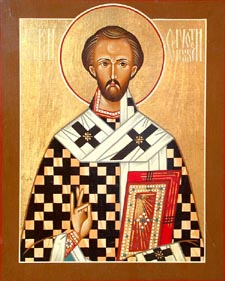|
|||
|---|---|---|---|
| This weekly bulletin insert complements the curriculum published by the Department of Christian Education of the Orthodox Church in America. This and many other Christian Education resources are available at http://dce.oca.org. | |||

The great 4th-century bishop, teacher and preacher Saint John Chrysostom wrote several "Instructions for Catechumens" as they prepare for baptism. His words have a note of joyful welcome to those about to become, in his words, "enrolled in the flock of Christ." Saint John chooses an intriguing way of showing them the great honor they are about to receive, comparing himself to Joseph in the Old Testament. When Joseph did a favor for the butler of Pharaoh, the Egyptian ruler, he asked the butler to put in a good word for him (Genesis 40: 14). Saint John compares himself to Joseph, telling the catechumens that they are about to be led to a kingdom, and not just any kingdom, but to the Kingdom of Heaven. He asks them to "remember me, therefore...when you receive the royal robe, when you are girt with the purple dipped in the master's blood, when you will be crowned with the diadem, which has luster leaping forth from it on all sides, more brilliant than the rays of the sun. Such are the gifts of the Bridegroom, greater indeed than your worth but worthy of His loving kindness." Chrysostom carries on the comparison to Joseph, who promised the butler that he would have the privilege of pouring Pharaoh's wine and placing the filled cup in his hand. Those who are about to be baptized, John says, will receive a much greater privilege: "But I say not that you shall give the cup into the hands of the king, but that the king shall give the cup into your hand—that dread cup, full of much power, and more precious than any created thing." Anointing is an important part of baptism, and Chrysostom reflects on its meaning. He says that the priest anoints the candidate with the sign of the cross so that Satan will not dare look that person in the face—the lightning flash leaping forth from the cross is blinding to his eyes. In fact, it is not the hand of the priest doing the anointing, but the hand of Christ himself. This is why the priest says, "You are baptized" rather than "I baptize you." He is the minister of the sacrament, but it is our all-powerful Lord whose hand is actually on the candidate.
Chrysostom likens baptism to marriage, with Christ as the Bridegroom. Earthly bridegrooms, he says, look at a prospective bride's attributes—her appearance, her station in life, the amount of money she has, her moral standards. But the divine Bridegroom does no such evaluating. He accepts His bride, meaning each of us coming to baptism, just as she is. Chrysostom writes of Christ the Bridegroom: "Even if someone is ugly, or poor as can be, or lowborn, or a slave, or an outcast, or maimed, or burdened by the weight of sins, the Bridegroom does not split hairs, nor is He inquisitive, nor does He demand an accounting. The gifts he gives are a master's munificence and grace." |
|||
